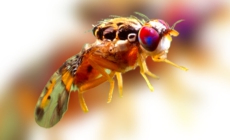-
Fruit Flies Are Invading Los Angeles. The Solution? More Fruit Flies. - November 1, 2023
-
A portion of Mulholland Drive, damaged by mudslides in winter storms, reopens - May 26, 2024
-
‘Maybe You Don’t Want to Win’ - May 26, 2024
-
Donald Trump Putting Law Enforcement in Danger: Attorney - May 25, 2024
-
Avoid the waters of these 5 L.A. County beaches this holiday weekend, public health officials say - May 25, 2024
-
Bawdy Comedy ‘Anora’ Wins Palme d’Or at Cannes Film Festival - May 25, 2024
-
Map Shows Heat Wave Zone Spread Into Five New States - May 25, 2024
-
Azusa police arrest suspected slingshot-wielding vandal - May 25, 2024
-
Donald Trump Hammers Judge Ahead of Jury Instructions - May 25, 2024
-
Sometimes U.S. and U.K. Politics Seem in Lock Step. Not This Year. - May 25, 2024
Fruit Flies Are Invading Los Angeles. The Solution? More Fruit Flies.
In response to the Queensland fruit fly outbreak, the Ventura County agricultural commissioner, Korrine Bell, told reporters that California was “facing an agricultural crisis.” She urged residents: “Please, don’t pack a pest.”
The Mediterranean fruit fly is among the most undiscerning, and therefore, destructive — it has made its home inside more than 250 kinds of produce, including avocados, tomatoes, mangoes and walnuts, and has spread across parts of Europe, the Middle East, Australia and the Americas. California — which grows a majority of the nation’s fruit and nuts — is among the states most at risk, according to the United States Department of Agriculture.
Although the Mediterranean fly does not pose a current risk to California’s crops, the potential repercussions, if the situation is not managed properly, could be devastating, agricultural experts say. “Growers would go out of business; packing houses would go bankrupt; the damage would be in the billions,” said James Cranney, the president of the California Citrus Quality Council. It would be, he added, an “untold level of catastrophe.”
The eradication plan for the flies in Leimert Park is part of a broader preventive release program that is run by the state Food and Agriculture Department and the U.S.D.A., and airdrops millions of sterile male Mediterranean fruit flies across counties in Southern California throughout the year. In the nearly three decades since its inception, the program has helped reduce the number of infestations by more than 90 percent, according to the state.
The barren males are bred at labs in Hawaii and Guatemala (where the pest is already present), and as pupae are dyed pink or orange to distinguish them from fertile flies. Each week, more than 200 million of the fluorescent insects are shipped to Los Alamitos, Calif., for distribution. After being carefully incubated, and later, fed a diet of sugar, water and an algae derivative, the adult flies are then loaded into planes with “release chutes” that evenly distribute them.
Source link
































